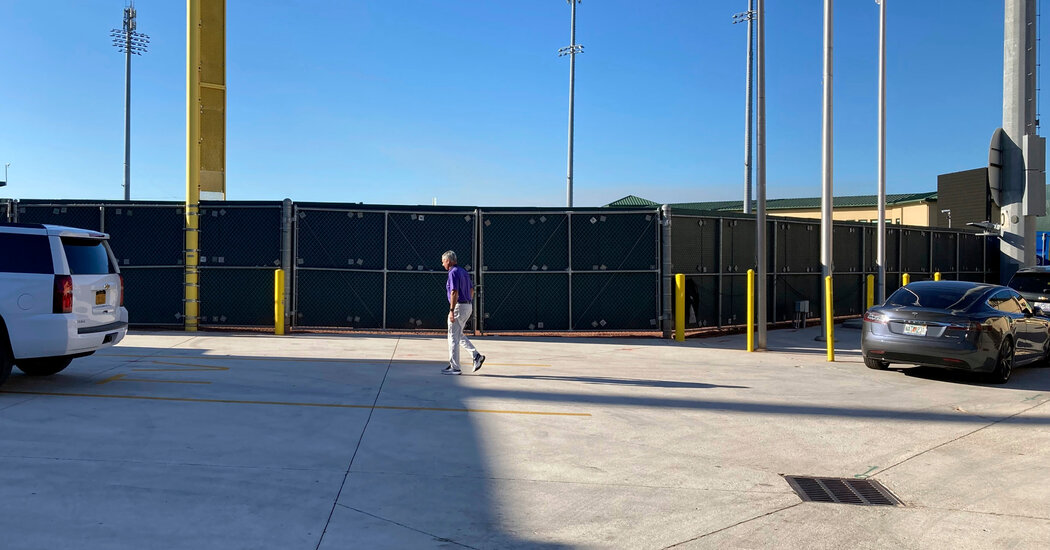
JUPITER, Fla. — And on the 85th day of baseball’s lockout, they met.
On Friday at Roger Dean Stadium — where officials from Major League Baseball and the players’ union have gathered all week in an attempt to negotiate a new labor deal with the start of the 2022 regular season fast approaching — M.L.B. Commissioner Rob Manfred and Tony Clark, the head of the union, huddled one on one for roughly 15 minutes.
It was the first time the two leaders of the sport had met since M.L.B. locked out the players on Dec. 2, the day after the previous five-year collective bargaining agreement expired.
It was also the first known in-person one-on-one meeting between Clark and Manfred since an ill-fated one in June 2020. They gathered then in Phoenix in an attempt to accelerate the contentious negotiations over the pandemic-shortened regular season. The sides, though, left that meeting with vastly different interpretations of what happened and grievances remain outstanding over how that season was carried out.
Friday’s meeting appeared to be different. Manfred, 63, surprised the union when he requested the talk with Clark, 49. (The union was unaware Manfred, who has a home in the area, was around.) The heads of the organizations are not typically in the bargaining room, leaving the lead negotiators to head those efforts.
Clark and Manfred had a “good conversation” that was “focused on how to move the process forward,” said a league spokesman who spoke to reporters on the condition that he not be named. Clark declined to comment.
Much is made of the relationship between Clark, a former player who took over leading the union in late 2013, and Manfred, the M.L.B. commissioner since January 2015 who, including in his previous roles, helped negotiate the four previous labor agreements without a dispute. The expired collective bargaining agreement is viewed as having further tilted the balance in the club owners’ favor, and players have been seeking a series of changes.
M.L.B. Off-Season Updates
M.L.B. has repeatedly made clear its view of the ongoing process. March 31 is the scheduled start of the 2022 regular season, and with insufficient progress made toward a new deal, the league doubled down on its position with a threat this week.
The league told the union on Wednesday that it was serious about its deadline of Feb. 28 for striking a new C.B.A. And if that deadline was not met, the league said it would begin canceling games, that it would not pay players for those missed games and that those contests would not be rescheduled.
M.L.B. believed that a minimum spring training length of four weeks — two weeks shorter than normal — made sense to avoid a spike in injuries, which occurred when training was abbreviated before the 60-game 2020 season. In order for that to work, the league believed that spring training in Arizona and Florida should start by March 3, and thus a new deal was desired by Monday.
The union, though, didn’t agree that Feb. 28 should be a firm deadline. In 1990, for example, the 32-day lockout cut spring training in half, but the full schedule of regular-season games was played, beginning a week later than usual. And during the current negotiations, the players have previously issued their own threat, telling M.L.B. that they were reluctant to grant club owners an expanded playoffs — worth an estimated $100 million annually — if games and money were taken from them.
Since Monday, not only have negotiators from M.L.B. and the union met daily for hours, but so have at least three club owners on the league’s labor committee — Dick Monfort of the Colorado Rockies, Ron Fowler of the San Diego Padres and Hal Steinbrenner of the Yankees — and nearly a dozen players.
Progress in the talks has been incremental. But on Friday, both sides acknowledged optimism about the headway made in one of the many outstanding issues: the amateur draft, which is expected to feature a lottery for the top handful of picks for the first time in baseball history in an attempt to prevent teams from purposefully losing in order to secure better draft positions.
Although the matter was not finalized, the sides met for nearly six hours on Friday — the longest bargaining session of the week — and exchanged counterproposals on the draft order. They agreed to meet again on Saturday, perhaps earlier than they had all week.
Saturday was originally supposed to be the first day of spring training games. But because of the ongoing negotiations and the lockout — the second longest work stoppage in M.L.B. history — major league camps didn’t start last week. M.L.B. announced then that exhibition games would be postponed “until no earlier” than March 5. On Friday, the M.L.B. spokesman said the postponement was extended through March 7.
This weekend may prove critical in determining whether more spring training and, more important, any regular-season games are lost. Perhaps the talks on Friday started some momentum.
Earlier this month, Manfred said losing regular-season games would be “disastrous” for the industry. Many big matters remain unresolved, from the luxury tax system to the players’ minimum salaries to the revenue sharing system among teams.




